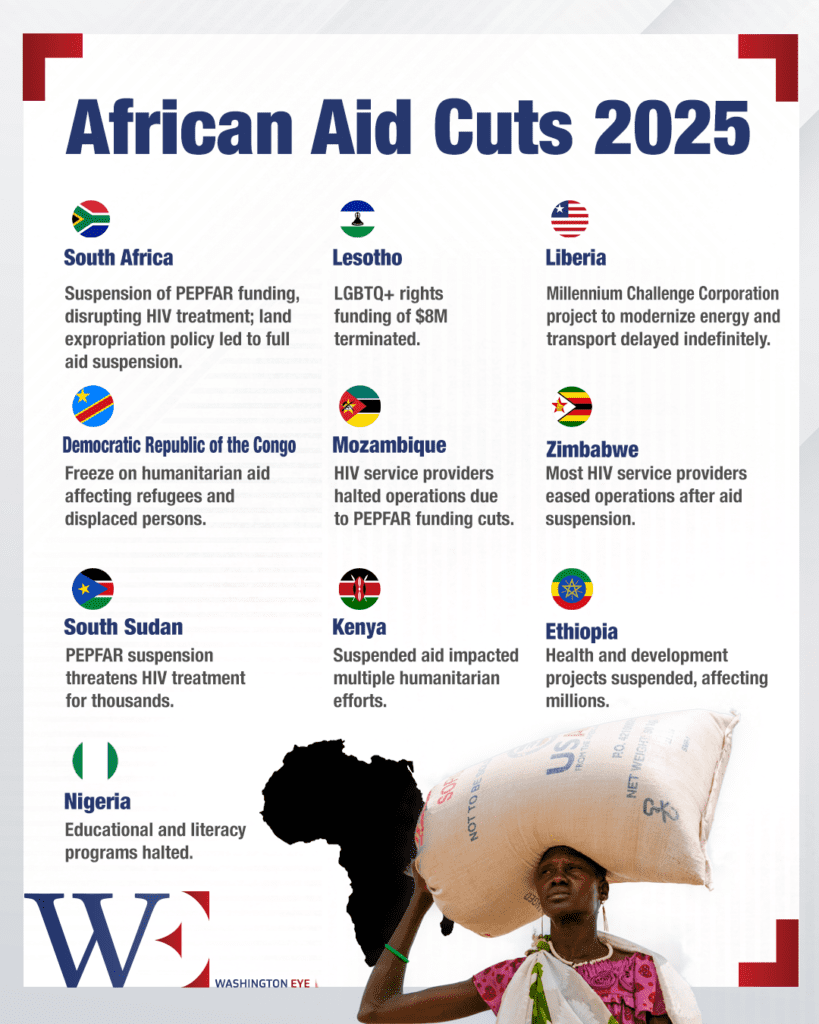In recent months, the relationship between the United States and African nations has experienced significant shifts marked by policy changes, diplomatic tensions, and evolving partnerships. These developments have had profound implications for global affairs, influencing climate initiatives, security programs, and international diplomacy.
A notable recent event is the United States’ decision to withdraw from the International Partners Group (IPG), a climate agreement designed to assist developing nations in transitioning from coal to green energy sources.
This coalition, which included countries like South Africa, Indonesia, and Vietnam, aimed to mobilize $45 billion for sustainable energy projects. The U.S. withdrawal, influenced by President Donald Trump’s “America First” executive order, has led to the loss of over $1 billion in U.S. investment for South Africa’s energy transition, resulting in the cancellation of various projects. Other IPG members, including the European Union, United Kingdom, Germany, and Japan, have reaffirmed their commitment to supporting these transitions.
Impact on Security and Development Programs
The Trump administration’s budgetary decisions have also targeted programs focused on preventing the proliferation of weapons of mass destruction (WMDs). Proposed cuts to the Defense Threat Reduction Agency (DTRA) could impair efforts against organized crime, terrorist organizations, and rogue states developing chemical weapons. Agencies estimate that a 20-60% reduction would severely affect mine-clearance operations, WMD non-proliferation programs, and pandemic surveillance efforts. Total elimination could increase risks of pathogen spread and make it easier for adversaries to develop WMDs. Diplomatic relations have been strained by recent events.
Lesotho’s Foreign Minister, Lejone Mpotjoane, criticized President Trump’s remarks referring to Lesotho as a country “that nobody has ever heard of” during a speech to Congress. This comment, made in the context of defending cuts to foreign aid, was met with disapproval from Lesotho’s leadership, who emphasized their sovereignty and the importance of respectful dialogue. Lesotho has been a recipient of substantial U.S. aid, particularly in combating HIV/AIDS, and the reduction of over 90% in U.S. assistance during the Trump administration has jeopardized these health programs.
In South Africa, President Cyril Ramaphosa expressed a desire to negotiate with President Trump to resolve disputes over land policy and a genocide case against Israel at the International Court of Justice. The U.S. had ordered cuts to financial assistance to South Africa due to its approach to land reform and the ICJ case. While South Africa does not heavily rely on U.S. aid, there are concerns about its preferential trade status under the African Growth and Opportunity Act (AGOA). Ramaphosa seeks to maintain good relations with the U.S., encompassing trade, diplomacy, and politics, despite differing positions on certain international issues.
The United Kingdom’s announcement of a significant reduction in its overseas aid budget, from 0.5% to 0.3% of its gross national income, has been condemned by international development groups as a betrayal to poorer countries. This cut, approximately £6 billion, reallocates funds to increase defense spending and is expected to result in severe consequences for global health and humanitarian initiatives. Critics argue that this decision will damage the UK’s reputation, undermine international partnerships, and jeopardize the lives of vulnerable populations amidst increasing global instability. Similar aid reductions by other nations, including the U.S., have disrupted life-saving programs in sub-Saharan Africa and imperiled global health and security.
African leaders have responded to President Trump’s second term with cautious optimism about potential beneficial partnerships but have minimal expectations of support for the continent. Historically, Africa has not been a priority in U.S. foreign policy, often viewed through the lens of countering rivals like Russia and China. Experts predict that Trump’s “America First” strategy and isolationist tendencies will result in Africa remaining low on his agenda. While there could be opportunities for trade deals, such as the renewal of AGOA, compliance concerns and security considerations could hinder progress. Additionally, potential cuts in U.S. funding for health and development programs under the Trump administration raise concerns about worsening conditions for vulnerable populations in Africa.
Official Statements and Future Outlook
Despite these challenges, official statements from previous U.S. administrations have emphasized a commitment to strengthening U.S.- Africa relations. The Vision Statement for the U.S.- Africa Partnership highlighted shared values, including a commitment to the United Nations Charter and defending sovereignty and territorial integrity. It also underscored the importance of addressing global issues such as climate change, health crises, and economic development through collaborative efforts. The U.S.-Africa Leaders Summit’s Joint Statement on Food Security reaffirmed a shared commitment to realizing African food security by establishing a strategic partnership to guide and accelerate their work. This framework aims to address both short-term and longer-term priorities, including improving Africa’s access to global markets for agricultural commodities and promoting transformative investments in sustainable and resilient food systems.
However, critiques have emerged regarding a perceived mismatch between rhetoric and action in U.S.- Africa relations. Some analysts argue that despite high-level engagements and policy commitments, there has been inadequate resource allocation and a lack of joint agenda-setting with African leaders. This has led to concerns about the effectiveness of the purported equal partnership between the U.S. and African nations.















